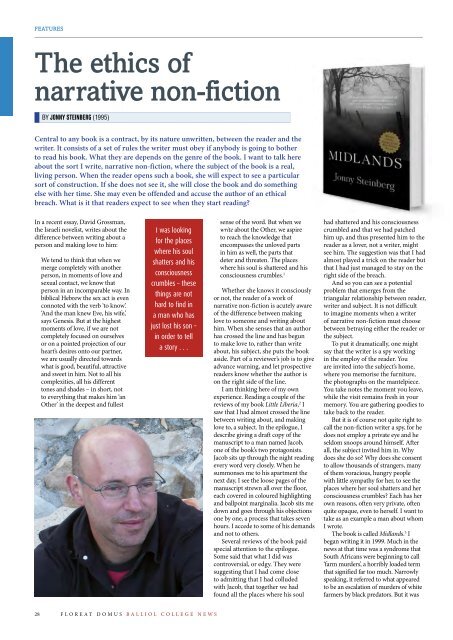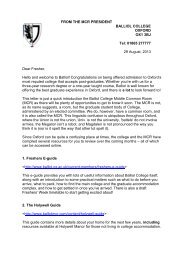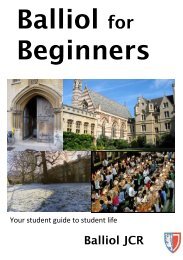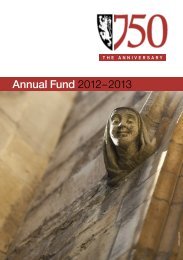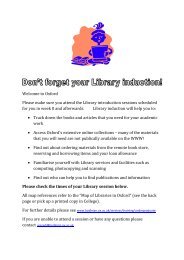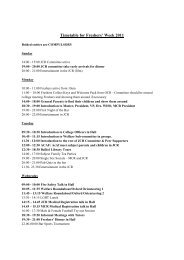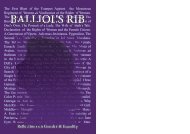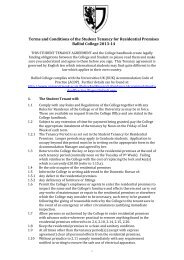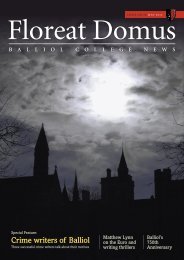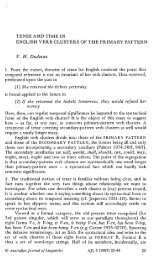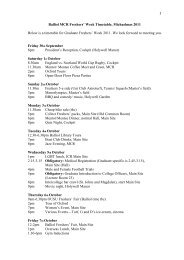Issue 19, 2013 - Balliol College - University of Oxford
Issue 19, 2013 - Balliol College - University of Oxford
Issue 19, 2013 - Balliol College - University of Oxford
You also want an ePaper? Increase the reach of your titles
YUMPU automatically turns print PDFs into web optimized ePapers that Google loves.
features<br />
The ethics <strong>of</strong><br />
narrative non-fiction<br />
By Jonny Steinberg (<strong>19</strong>95)<br />
Central to any book is a contract, by its nature unwritten, between the reader and the<br />
writer. It consists <strong>of</strong> a set <strong>of</strong> rules the writer must obey if anybody is going to bother<br />
to read his book. What they are depends on the genre <strong>of</strong> the book. I want to talk here<br />
about the sort I write, narrative non-fiction, where the subject <strong>of</strong> the book is a real,<br />
living person. When the reader opens such a book, she will expect to see a particular<br />
sort <strong>of</strong> construction. If she does not see it, she will close the book and do something<br />
else with her time. She may even be <strong>of</strong>fended and accuse the author <strong>of</strong> an ethical<br />
breach. What is it that readers expect to see when they start reading<br />
In a recent essay, David Grossman,<br />
the Israeli novelist, writes about the<br />
difference between writing about a<br />
person and making love to him:<br />
We tend to think that when we<br />
merge completely with another<br />
person, in moments <strong>of</strong> love and<br />
sexual contact, we know that<br />
person in an incomparable way. In<br />
biblical Hebrew the sex act is even<br />
connoted with the verb ‘to know’.<br />
‘And the man knew Eve, his wife,’<br />
says Genesis. But at the highest<br />
moments <strong>of</strong> love, if we are not<br />
completely focused on ourselves<br />
or on a pointed projection <strong>of</strong> our<br />
heart’s desires onto our partner,<br />
we are usually directed towards<br />
what is good, beautiful, attractive<br />
and sweet in him. Not to all his<br />
complexities, all his different<br />
tones and shades – in short, not<br />
to everything that makes him ‘an<br />
Other’ in the deepest and fullest<br />
I was looking<br />
for the places<br />
where his soul<br />
shatters and his<br />
consciousness<br />
crumbles – these<br />
things are not<br />
hard to find in<br />
a man who has<br />
just lost his son –<br />
in order to tell<br />
a story . . .<br />
sense <strong>of</strong> the word. But when we<br />
write about the Other, we aspire<br />
to reach the knowledge that<br />
encompasses the unloved parts<br />
in him as well, the parts that<br />
deter and threaten. The places<br />
where his soul is shattered and his<br />
consciousness crumbles. 1<br />
Whether she knows it consciously<br />
or not, the reader <strong>of</strong> a work <strong>of</strong><br />
narrative non-fiction is acutely aware<br />
<strong>of</strong> the difference between making<br />
love to someone and writing about<br />
him. When she senses that an author<br />
has crossed the line and has begun<br />
to make love to, rather than write<br />
about, his subject, she puts the book<br />
aside. Part <strong>of</strong> a reviewer’s job is to give<br />
advance warning, and let prospective<br />
readers know whether the author is<br />
on the right side <strong>of</strong> the line.<br />
I am thinking here <strong>of</strong> my own<br />
experience. Reading a couple <strong>of</strong> the<br />
reviews <strong>of</strong> my book Little Liberia, 2 I<br />
saw that I had almost crossed the line<br />
between writing about, and making<br />
love to, a subject. In the epilogue, I<br />
describe giving a draft copy <strong>of</strong> the<br />
manuscript to a man named Jacob,<br />
one <strong>of</strong> the book’s two protagonists.<br />
Jacob sits up through the night reading<br />
every word very closely. When he<br />
summonses me to his apartment the<br />
next day, I see the loose pages <strong>of</strong> the<br />
manuscript strewn all over the floor,<br />
each covered in coloured highlighting<br />
and ballpoint marginalia. Jacob sits me<br />
down and goes through his objections<br />
one by one, a process that takes seven<br />
hours. I accede to some <strong>of</strong> his demands<br />
and not to others.<br />
Several reviews <strong>of</strong> the book paid<br />
special attention to the epilogue.<br />
Some said that what I did was<br />
controversial, or edgy. They were<br />
suggesting that I had come close<br />
to admitting that I had colluded<br />
with Jacob, that together we had<br />
found all the places where his soul<br />
had shattered and his consciousness<br />
crumbled and that we had patched<br />
him up, and thus presented him to the<br />
reader as a lover, not a writer, might<br />
see him. The suggestion was that I had<br />
almost played a trick on the reader but<br />
that I had just managed to stay on the<br />
right side <strong>of</strong> the breach.<br />
And so you can see a potential<br />
problem that emerges from the<br />
triangular relationship between reader,<br />
writer and subject. It is not difficult<br />
to imagine moments when a writer<br />
<strong>of</strong> narrative non-fiction must choose<br />
between betraying either the reader or<br />
the subject.<br />
To put it dramatically, one might<br />
say that the writer is a spy working<br />
in the employ <strong>of</strong> the reader. You<br />
are invited into the subject’s home,<br />
where you memorise the furniture,<br />
the photographs on the mantelpiece.<br />
You take notes the moment you leave,<br />
while the visit remains fresh in your<br />
memory. You are gathering goodies to<br />
take back to the reader.<br />
But it is <strong>of</strong> course not quite right to<br />
call the non-fiction writer a spy, for he<br />
does not employ a private eye and he<br />
seldom snoops around himself. After<br />
all, the subject invited him in. Why<br />
does she do so Why does she consent<br />
to allow thousands <strong>of</strong> strangers, many<br />
<strong>of</strong> them voracious, hungry people<br />
with little sympathy for her, to see the<br />
places where her soul shatters and her<br />
consciousness crumbles Each has her<br />
own reasons, <strong>of</strong>ten very private, <strong>of</strong>ten<br />
quite opaque, even to herself. I want to<br />
take as an example a man about whom<br />
I wrote.<br />
The book is called Midlands. 3 I<br />
began writing it in <strong>19</strong>99. Much in the<br />
news at that time was a syndrome that<br />
South Africans were beginning to call<br />
‘farm murders’, a horribly loaded term<br />
that signified far too much. Narrowly<br />
speaking, it referred to what appeared<br />
to be an escalation <strong>of</strong> murders <strong>of</strong> white<br />
farmers by black predators. But it was<br />
28<br />
floreat domus balliol college news


